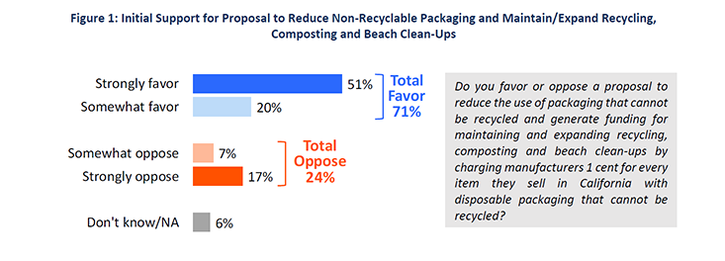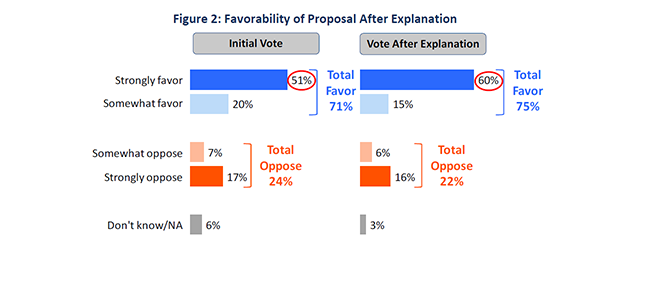FM3 Survey: Californians Favor Call to Reduce Plastic Pollution
Respondents reveal their support for a proposal to reduce the use of non-recyclable packaging and provide funding for statewide recycling and composting.
A statewide survey of California voters finds a strong majority of respondents favor a proposal to reduce single-use plastics and generate funds to build more recycling and composting facilities statewide.
The survey also shows that voters’ opinions on the proposal grow more favorable as they hear about California’s inability to recycle the amount of plastic and paper waste that is currently being generated and the need for funding to help maintain and expand recycling and composting efforts.
Fairbank, Maslin, Maullin, Metz & Associates (FM3) conducted the dual-mode telephone and online survey between June 6 and 13. Data presented is based on 813 completed survey interviews with voters in California likely to vote in the November 2020 presidential election. The margin of error for the sample is +/-3.5 percent with a 95 percent confidence interval. Some percentages may not sum to 100 percent due to rounding.
Key survey findings from the FM3 survey include the following:
Based solely on a brief description, seven in 10 (71 percent) voters favor the proposal to reduce the use of packaging that cannot be recycled and generate funding for maintaining and expanding recycling and composting, as well as beach cleanups (See Figure 1 below). The proposal would establish a 1-cent fee on manufacturers for every item they sell in California with packaging that cannot be recycled. More than half of respondents (51 percent) strongly favor the proposal and an additional 20 percent somewhat favor it. Further, support for the proposal is broad; nearly two-thirds of respondents favor it across major demographic groups including gender, age, income, voting propensity, geography and race/ethnicity.

The intensity of favorability for the proposal increases significantly after respondents learn more information about California’s inability to process its paper, plastic and organic waste. They were provided with the following description of the proposal:
There are not enough recycling processing facilities in California to handle the amount of plastic and paper that is put in recycling bins by California residents, so over the last decade, most of it has been sent to China and other countries for recycling. But within the last few years, these countries have decided to stop accepting plastic and paper for recycling from California and the rest of the United States. This has meant that thousands of tons of plastic and paper has gone to landfills or has been burned instead of being recycled, and the cost of recycling has increased dramatically.
In addition, 9 million tons of organic waste that could be composted goes to landfills each year. Without funding to build recycling facilities in California, expand existing ones and increase the use of composting for organic materials, composting and recycling with be reduced even more and parts of California may give up on recycling altogether.
After receiving this information, the percentage of respondents who strongly favor the proposal increased by nine percentage points, from 51 percent to 60 percent, while overall favorability rose from 71 percent to 75 percent (See Figure 2 below).

Respondents believe it is “extremely or very important” to use the revenue generated by this proposal to help preserve water quality, increase recyclable materials, expand recycling and reduce the use of pesticides. At least 75 percent of all respondents prioritized funding for the following projects:
Protecting groundwater and local clean drinking water supplies (91 percent extremely/very important)
Reducing runoff of pesticides into waterways (83 percent)
Protecting and cleaning up rivers, lakes, streams, coastal waters and beaches (83 percent)
Improving water quality to protect marine life and habitats (81 percent)
Using more recyclable packaging materials (76 percent)
Expanding California's ability to recycle paper and plastics (76 percent)
Reducing emissions of chemicals that create air pollution and lead to climate change (75 percent)
Using natural compost to grow more nutritious produce with less pesticides (75 percent)
Overall, the survey shows respondents strongly favor a proposal to reduce the amount of single-use, non-recyclable plastic packaging sold in the state and maintain and expand recycling and composting efforts through a 1-cent fee charged to manufacturers for every item they sell in the state in non-recyclable packaging. Voters’ favorability for the proposal increases and grows more intense as they learn more about the shortage of recycling and composting processing facilities. Voters prioritize spending for projects that will protect water quality, reduce the use of single-use packaging materials, expand recycling and reduce the use of pesticides in agriculture.
About the Author
You May Also Like


